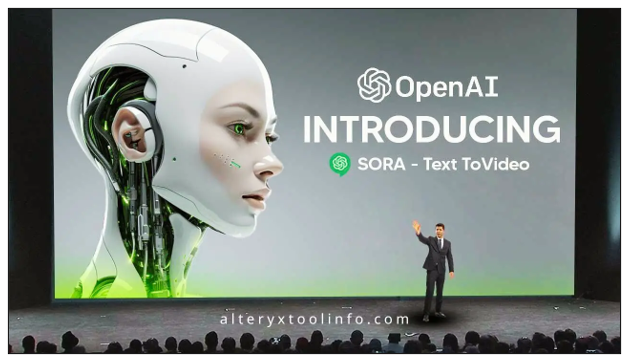 |
| By Jon Markman |
Tyler Perry runs a billion-dollar film operation in Atlanta. He ended an $800 million expansion plan last week after seeing Sora, a generative AI model that turns simple text into photorealistic video.
Generative AI burst onto the scene in December 2023 when OpenAI, the company also behind Sora, brought ChatGPT to the masses.
The large language model used the power of thousands of Nvidia (NVDA) graphics processing units coupled with software to turn simple text inputs into human-like responses, prose, poetry and even new software code. It was an innovation that most people thought was decades away.
Sora brings generative AI to video, and it is even more impressive.

Tyler Perry is best known for his film role as Medea, a tough-talking, gun-toting elderly woman who always speaks her mind. Tyler wrote, directed and produced 10 films in the series, earning hundreds of millions in official box office receipts. It also made him a billionaire.
Perry planned to parlay his success into a giant expansion of his existing 330-acre property in Atlanta. The project would have added 12 soundstages at a cost of $800 million. After seeing Sora last week, that initiative has been mothballed.
Sora can turn simple text into photorealistic video that can be used in film.
Perry explained last week to the Hollywood Reporter that he couldn’t believe his eyes. Traveling to locations to film and elaborate soundstages would be superfluous. Sora can generate scenes at Colorado ski resorts or perfect tricky shots on the moon … all with a simple text prompt.
Behind the scenes, Sora is rendering physics, skipping the biggest part of software development.
Computer graphics came to film when engineers found a way to digitally replicate photorealistic experiences. Typically, the physics of scenes is written by a software engineer. Then that code is rendered by an engine like Unreal.
Put bluntly, Sora is software that writes astonishingly good software without the need for engineers.
This productivity angle is the investment opportunity most are still missing with the so-called “Magnificent Seven,” the giant technology platforms that have become the most valuable publicly traded companies in the world.
These companies employ thousands of software engineers. AI will dramatically reduce the need for coders, leading to fantastic productivity gains.
Accenture (ACN) will bring those productivity gains to the rest of the enterprise world.
The Dublin, Ireland company is a dominant global professional services company, serving 9,000 clients in over 120 countries. The firm has built tremendous expertise in digital transformation, cloud security, interactive services and strategic consulting.
Julie Sweet, chief executive officer, noted in December that new bookings grew in Q1 to $18.4 billion, up 14% year over year.
Fees from consulting during the same time frame accounted for $8.6 billion, 47% of the business.
More importantly, Accenture is building this impressive backlog while increasing productivity. The company had 11% voluntary attrition in the quarter, according to the corporate press release.
AI Lighthouse is a joint venture with ServiceNow (NOW) and Nvidia. The project was launched in October 2023 and combines the automation platform of ServiceNow, supercomputing from Nvidia and Accenture’s digital transformation expertise.

The stated goal of Lighthouse is to help companies develop custom generative AI to increase productivity for projects like drug discovery, customer service, intelligent recommendations for software developers and other applications. Lighthouse will help companies do more with fewer employees, increasing profits.
Tyler Perry is correct to see the potential of generative AI. Software is going to obsolete a big portion of the physical world, let alone make-believe sets for movie shoots. AI will make his business far more profitable.
Investors need to see this opportunity. Companies are on the precipice of doing far more with fewer employees. The AI productivity revolution is hiding in plain sight.
Accenture is a facilitator, and demand for its services are going to shift into hyper gear.
But it isn’t the only non-Nvidia out there finding its path forward with AI. In fact, I recently put together a presentation on how to navigate the trillions in profits that AI is about to start paying. Click here to check that out.
All the best,
Jon D. Markman

